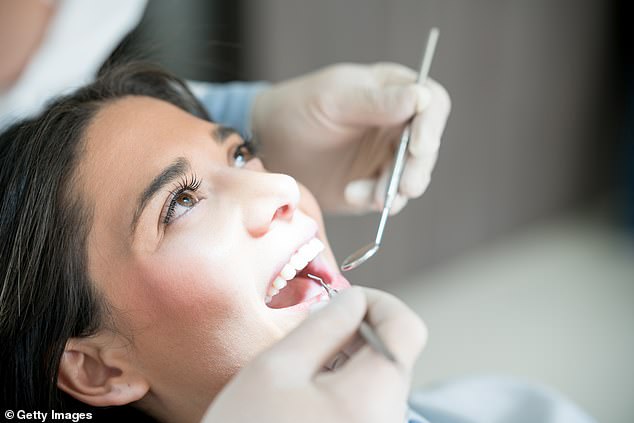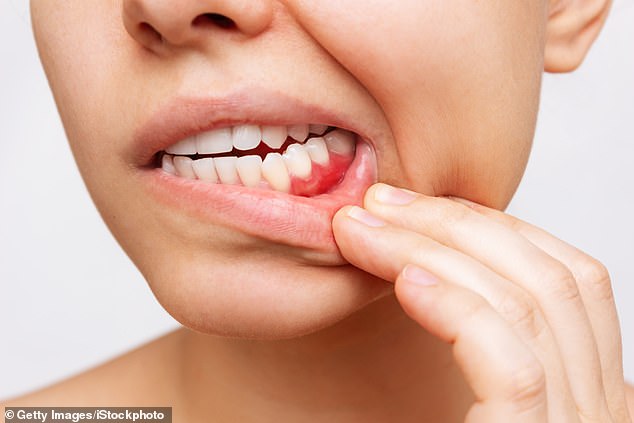A groundbreaking dental test could reveal your risk of cancer and dementia – but for £350 would YOU do it?
A groundbreaking test could use a small sample of spit to signal the risk of heart disease, cancer and dementia.
By analyzing the types of bacteria in the mouth – known as the oral microbiome – experts believe they can identify high-risk pathogens that cause long-term health problems throughout the body.
The makers of the £350 test, called ORALIS 1, claim that if it is more widely adopted by the NHS it could revolutionize healthcare, and they predict that a simple visit to the dentist could one day could provide life-changing information about your overall health. .
The only question is of course: would you like to know? For me the answer was yes. Because while a poor oral microbiome can increase health risks, improving it and reducing risks is quite easy if you catch it early.
But when I was offered the opportunity to take the ORALIS 1 test, I was apprehensive. Because – I’m a little ashamed to admit it – I haven’t been to the dentist once in the last six years.
It may sound surprising or arrogant. Even a little… er, unsanitary. However, I am far from alone.
According to the Oral Health Foundation, nearly 40 percent of adults do not visit the dentist regularly. No doubt some of this is due to a total shortage of dental appointments on the NHS – there is a national waiting list of 10 million people, the latest data shows.
Cost is another factor: dental appointments can start at around $26, but a visit to a dental hygienist will cost you almost $100.
Luke Chafer (photo) tried out the ORALIS 1. The kit claims it could revolutionize healthcare, and they predict that a simple visit to the dentist could one day give you life-changing information about your overall health

According to the Oral Health Foundation, almost 40 percent of adults do not visit the dentist regularly (stock image)
Amazingly, one in twenty has never been to the dentist in their adult life. Not even once. And at 23, I was one of them.
But how much damage could I have done at such a young age? It turns out to be quite a lot.
“Research has linked problems with the oral microbiome to other serious health problems occurring elsewhere in the body,” explains Dr Gary Moran, professor of dental hygiene at Trinity College Dublin and one of the test’s developers, who says there risks are for things like the heart. health can accumulate even from childhood.
Scientists believe that an imbalance in the oral microbiome can cause bacteria to travel to other parts of the body, releasing destructive enzymes that can reduce the ability of blood vessels to dilate and increase blood pressure.
A recent study funded by the British Heart Foundation found that people with gum disease were 69 percent more likely to develop type 2 diabetes – the problem of blood sugar control that dramatically increases the risk of heart attacks and strokes.
And while not all bacteria in the mouth are harmful – in fact, 80 percent are essential for maintaining a healthy mouth – research has linked particularly high levels of certain strains to rheumatoid arthritis, Alzheimer’s disease and even colon cancer.
So you can imagine my horror when my ORALIS 1 results informed me that the number of insects currently rooting around my mouth was alarmingly high.
Among the nasty specimens covering my teeth were two strains of bacteria linked to some of the most terrifying diseases.

Scientists believe that an imbalance in the oral microbiome could cause bacteria to travel to other parts of the body, releasing destructive enzymes that can reduce the ability of blood vessels to dilate and increase blood pressure (stock image)
One of these – treponema denticola – is strongly linked to gum disease, which is the main reason people lose their teeth.
The other – Fusobacterium nucleatum – is even more worrying.
This promotes inflammation associated with the onset of gum disease. But in addition, according to a 2022 study, particularly high concentrations of the species are often found in the saliva of colon cancer patients.
I had more than 2,500 times the amount considered normal.
‘In addition to the link with cancer, there is a lot of research showing that fusobacterium nucleatum is linked to infertility and cardiovascular disease,’ says Dr Victoria Sampson, dentist at The Health Society in London.
‘But the good thing is that we can get rid of it relatively easily.’
The advice is simple: buy a new toothbrush, floss daily, drink a cup of green tea every day – because it contains anti-inflammatory substances – and of course make more frequent dental hygiene appointments.
“These results show that your oral hygiene isn’t great,” Dr. Moran warns me. ‘If you do nothing, you will be at high risk of a whole range of diseases within a few decades.’

Treponema denticola – is strongly associated with gum disease, which is the main reason people lose their teeth (Stock Image)
Those who have an increased genetic risk for heart disease, cancer or other problems because they run in the family may see problems even sooner, he adds. Fortunately not.
Experts hope that the ORALIS 1 test, alongside more research into how the oral microbiome works, can help change the UK’s approach to dentistry.
“At this point we still don’t know what the cause and effect relationship is, but we do know that oral bacteria can affect your long-term health,” says Dr. Moran.
Recent survey data showed that only 3 percent of Brits who tried to get a dental appointment on the NHS managed to get one in the past two years.
‘We know people are struggling to get an appointment, so if we could roll this out across the board in ten or twenty years’ time it could give us a really good insight into your health before any problems arise’ , adds Dr. Sampson. .
After the test I made an appointment to visit the dental hygienist. Other than a minor gum infection, I don’t seem to have any other serious problems. She told me to come back in three months, and I definitely plan to.
